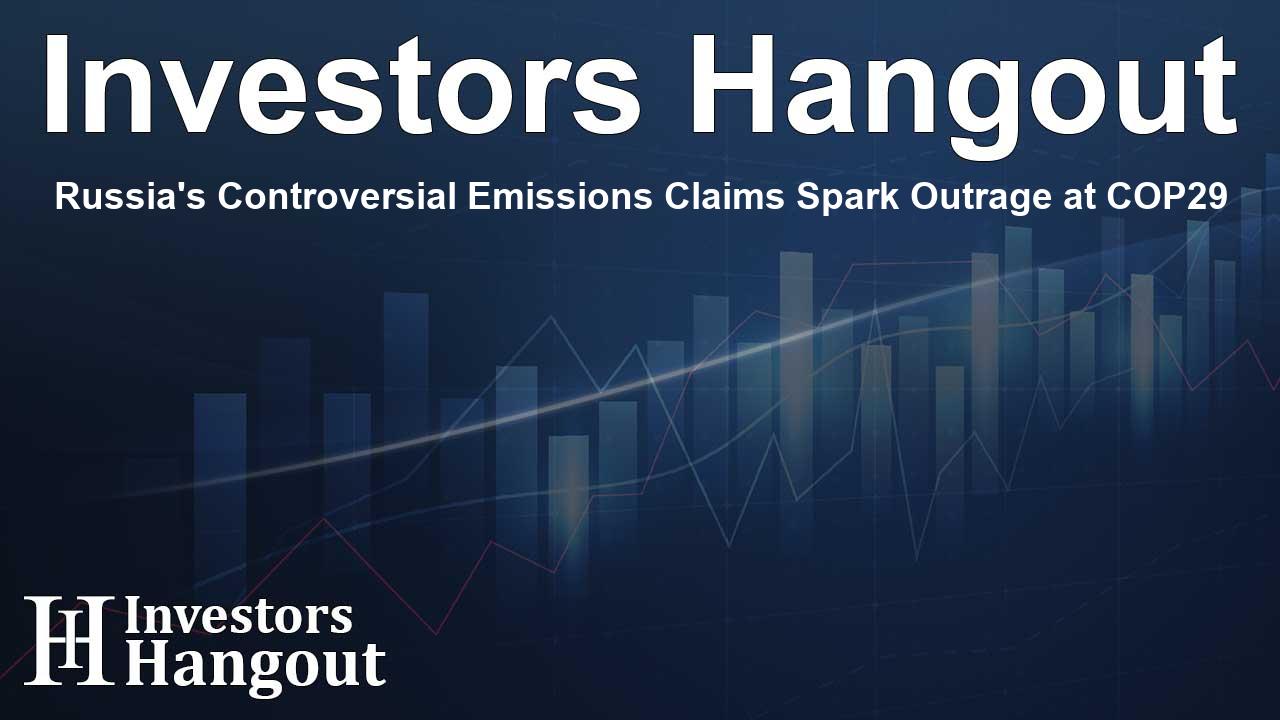Russia's Controversial Emissions Claims Spark Outrage at COP29

Russia's Greenhouse Gas Reporting at COP29
Russia's recent declaration at the COP29 climate summit, which includes occupied territories in Ukraine in its greenhouse gas inventory, has stirred significant dissent among Ukrainian leaders and environmental activists. The response from Ukraine underscores the tensions surrounding international standards and ethical considerations in environmental reporting.
A Surprising Submission to the UN
By officially integrating these territories in its emissions report, Russia aims to solidify its claims on regions that are under dispute. This report was submitted to the United Nations Framework Convention on Climate Change (UNFCCC), creating immediate backlash as Ukrainian officials oppose the legitimacy of these actions.
Ukrainian Officials Respond
Deputy Environment Minister Olga Yukhymchuk spoke out against Russia's attempts to normalize its occupation, stating, "Russia is using international platforms to legalize their actions." The Ukrainian government is now actively pursuing assistance from the UNFCCC to mediate this alarming situation.
Concerns about Emissions Double-Counting
The National Inventory Report submitted by Russia presents data for 85 out of 89 territories, citing difficulties in acquiring baseline information for specific annexed regions. Yukhymchuk has voiced strong concerns regarding potential double-counting of emissions, which could threaten global climate objectives, especially if comprehensive reporting under international agreements isn't maintained.
Impact on Global Climate Efforts
The controversy surrounding Russia's assertion raises questions about the integrity of international efforts to combat climate change. Experts warn that the ongoing geopolitical strife could detract from essential dialogues aimed at addressing global warming and environmental sustainability.
Expert Opinions on the Matter
Following the summit, Nikki Reisch, director of a prominent environmental law organization, emphasized that geopolitical divisions are compromising vital climate discussions. In parallel, Christina Voigt, a law professor specializing in international law, underscored that Russia’s reporting techniques might infringe upon Ukraine’s sovereignty, identifying this action as a blatant unilateral declaration contrary to international law.
The Legal Implications of Emissions Claims
Voigt elaborated that although it may not be inherently illegal to claim emissions from an occupied territory, labeling them as emissions from one's own territory is problematic and potentially illegal. Such claims could lead to broader implications if Russia attempts to market emissions reductions from these regions as offsets.
The Future of Climate Accountability
The implications of Russia's approach not only threaten Ukraine's geopolitical landscape but also challenge the principles of accountability within international climate agreements. The concerns presented by Ukrainian leaders highlight the necessity for transparent reporting and adherence to ethical standards in global climate politics.
Frequently Asked Questions
What are the key issues raised by Ukraine regarding Russia's emissions report?
Ukraine is contesting Russia's inclusion of annexed territories in its emissions reporting, fearing the legal and climate integrity implications of double-counting.
What impact does Russia’s claim have on international climate agreements?
This claim raises concerns about the validity and transparency of emissions data, which could undermine global climate efforts under the Paris Agreement.
How are Ukrainian officials responding to the situation?
Ukrainian officials are engaging with the UNFCCC to mediate the dispute, asserting that Russia’s reporting is an infringement on their sovereignty.
What has been stated by climate experts regarding this issue?
Experts emphasize that such geopolitical disputes detract from the focus on combating climate change and could have legal ramifications under international law.
How might this situation affect future negotiations at climate summits?
The situation may impede collaborative efforts and trust at future climate summits if issues around reporting are not resolved effectively.
About The Author
Contact Olivia Taylor privately here. Or send an email with ATTN: Olivia Taylor as the subject to contact@investorshangout.com.
About Investors Hangout
Investors Hangout is a leading online stock forum for financial discussion and learning, offering a wide range of free tools and resources. It draws in traders of all levels, who exchange market knowledge, investigate trading tactics, and keep an eye on industry developments in real time. Featuring financial articles, stock message boards, quotes, charts, company profiles, and live news updates. Through cooperative learning and a wealth of informational resources, it helps users from novices creating their first portfolios to experts honing their techniques. Join Investors Hangout today: https://investorshangout.com/
The content of this article is based on factual, publicly available information and does not represent legal, financial, or investment advice. Investors Hangout does not offer financial advice, and the author is not a licensed financial advisor. Consult a qualified advisor before making any financial or investment decisions based on this article. This article should not be considered advice to purchase, sell, or hold any securities or other investments. If any of the material provided here is inaccurate, please contact us for corrections.
